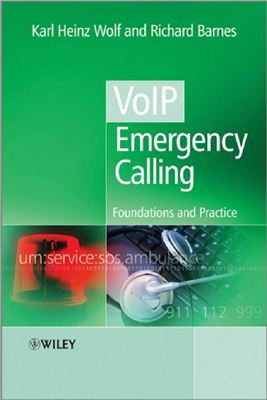This book provides a comprehensive view of the emerging standards
for VoIP emergency calling from an Inteational perspective.
238 pages.
published 2011.
In this book, the authors provide a treatment of the VoIP emergency calling process that is both comprehensive, looking at all aspects of emergency calling, and practical, providing technical details on how such functions can be implemented. In addition, the authors describe the standardization efforts of the Inteet Engineering Task Force who are currently working to improve the situation for VoIP emergency calls. The book provides an overview of emergency calling with a particular focus on the ECRIT emergency calling architecture, and discusses considerations related to implementation, deployment, and regulation of next-generation emergency calling. It also takes a look at practical aspects of emergency calling, with a set of exercises to help the reader get familiar with the technologies involved.
Key Features:
* Comprehensive view of emerging standards for VoIP emergency calling from an inteational perspective
* Practical guides for implementing the core of the emergency calling architecture
* Architectural, practical, and regulatory perspectives
* Written by experts working on the development of emergency calling architectures and its implementation
* Includes an accompanying website with open-source software packages (http://www.voip-sos.net/)
This book will be an invaluable resource for product managers and developers, equipment vendors, network operators, emergency service providers, and telecommunications regulators. Industry professionals interested in standards compliance will also find this book of interest.
238 pages.
published 2011.
In this book, the authors provide a treatment of the VoIP emergency calling process that is both comprehensive, looking at all aspects of emergency calling, and practical, providing technical details on how such functions can be implemented. In addition, the authors describe the standardization efforts of the Inteet Engineering Task Force who are currently working to improve the situation for VoIP emergency calls. The book provides an overview of emergency calling with a particular focus on the ECRIT emergency calling architecture, and discusses considerations related to implementation, deployment, and regulation of next-generation emergency calling. It also takes a look at practical aspects of emergency calling, with a set of exercises to help the reader get familiar with the technologies involved.
Key Features:
* Comprehensive view of emerging standards for VoIP emergency calling from an inteational perspective
* Practical guides for implementing the core of the emergency calling architecture
* Architectural, practical, and regulatory perspectives
* Written by experts working on the development of emergency calling architectures and its implementation
* Includes an accompanying website with open-source software packages (http://www.voip-sos.net/)
This book will be an invaluable resource for product managers and developers, equipment vendors, network operators, emergency service providers, and telecommunications regulators. Industry professionals interested in standards compliance will also find this book of interest.

